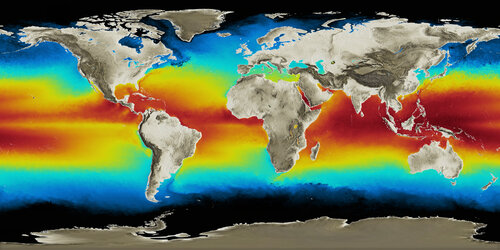Satellites help ensure safe sunning
Excessive exposure to ultraviolet radiation is responsible for up to
Thanks to an innovative service called HappySun, the UV Index can be delivered directly to mobile phones via SMS or can be accessed on the Internet. HappySun calculates the UV Index throughout the day by using ESA satellite data on radiation, ozone and cloud coverage. The service has just completed its two-year-long test phase and has received positive feedback from users.
"HappySun is a tool for the primary prevention of skin cancer," Franco Marsili, Director of the Dermatology Clinic at the Versilia Hospital in Italy, said. "The aim is to educate people about the intelligent ‘use’ of the sun."

Users are able to personalise the service by completing an online questionnaire about skin sensitivity to UV. Once users specify the place and time of sun exposure, HappySun calculates the personal safe exposure time and suggests the adequate sun protection factor (SPF).
The World Health Organisation (WHO) report, ‘Global Burden of Disease of Solar Ultraviolet Radiation’, says of the 60 000 deaths annually an estimated 48 000 are caused by malignant melanomas and 12 000 by skin carcinomas.
The report also recognises that ultraviolet radiation has beneficial effects such as the production of vitamin D, which prevents diseases such as osteoporosis and rickets. The WHO says vitamin D levels are in most cases maintained with minimal UVR exposure and warns over-exposure to the sun’s radiation is much more dangerous than insufficient vitamin-D levels.

By using data from Envisat and Meteosat-8 satellites, HappySun is also able to offer the sea surface temperature and sea water transparency. Knowing the sea temperature allows tourists to make decisions on holiday destinations depending on their desire for cool or warm waters. Knowledge of the sea water transparency is useful for tourists wanting to dive in waters with good visibility in order to explore the marine environment.
The UV protection service is currently available in Tuscany, Italy, for APT Versilia and Sardinia, Italy, for Baja Hotels. The APT Versilia website shows the temperature of the Versilia sea, while the Baja Hotels’ website shows sea temperature implemented in a Google Maps interface.
"Tourists appreciate having a ‘satellite eye’ that takes care of their skin during sun exposure. Tourists, snorkellers and divers all appreciate having information on sea water in order to find the best conditions," Baja Hotels General Manager Marco Bongiovanni said.

"HappySun is an innovative service conceived in the scope of a European project with the aim of spreading the information regarding benefits and drawbacks associated to heliotherapy," Renato Baldi, APT Versilia Director, said. "We have hosted such a service on our website to promote Versilia as a place where people can sun safely."
These types of services are set to continue in the near future, as HappySun is following up the tourism aspects of the service with tour and hotel operators in preparation for next summer. In addition, the Global Monitoring of the Environment and Security (GMES) initiative – a joint initiative of the European Commission and ESA – is incorporating the public health aspects within its portfolio of services.
The HappySun service, provided by Flyby s.r.l., is backed by an ESA Earth Observation Market Development (EOMD) programme aimed at fostering the development of Earth Observation data within business practices.















 Germany
Germany
 Austria
Austria
 Belgium
Belgium
 Denmark
Denmark
 Spain
Spain
 Estonia
Estonia
 Finland
Finland
 France
France
 Greece
Greece
 Hungary
Hungary
 Ireland
Ireland
 Italy
Italy
 Luxembourg
Luxembourg
 Norway
Norway
 The Netherlands
The Netherlands
 Poland
Poland
 Portugal
Portugal
 Czechia
Czechia
 Romania
Romania
 United Kingdom
United Kingdom
 Slovenia
Slovenia
 Sweden
Sweden
 Switzerland
Switzerland





























